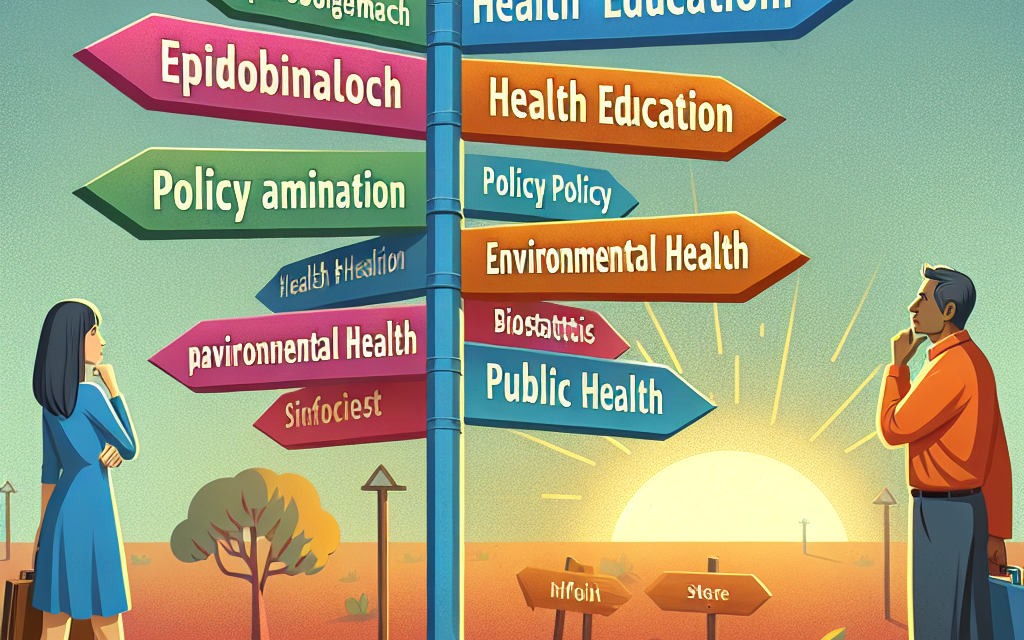Navigating Public Health Careers: Opportunities for Impact and Innovation
Public health is a dynamic and multifaceted field that plays a crucial role in improving the health and well-being of populations. As the world faces complex health challenges, the demand for skilled public health professionals continues to grow. This article explores the various career opportunities within public health, the skills required, and the innovative approaches that are shaping the future of the field. We will delve into five key subtopics: the landscape of public health careers, essential skills for success, innovative practices in public health, the role of technology, and the future of public health careers.
The Landscape of Public Health Careers
The field of public health encompasses a wide range of careers that address health issues at the community, national, and global levels. Public health professionals work in various settings, including government agencies, non-profit organizations, healthcare institutions, and academic institutions. The diversity of roles available allows individuals to find a niche that aligns with their interests and skills.
Some common career paths in public health include:
- Epidemiologist: Epidemiologists study the distribution and determinants of health-related states in populations. They analyze data to identify trends and outbreaks, contributing to disease prevention and control efforts.
- Public Health Educator: These professionals develop programs and materials to educate communities about health issues, promoting healthy behaviors and lifestyles.
- Health Policy Analyst: Health policy analysts research and evaluate policies related to public health, providing recommendations to improve health outcomes and access to care.
- Biostatistician: Biostatisticians apply statistical methods to analyze data related to health and disease, helping to inform public health decisions.
- Global Health Specialist: These professionals work on health issues that transcend national borders, addressing challenges such as infectious diseases, maternal and child health, and health systems strengthening.
According to the U.S. Bureau of Labor Statistics, employment in public health careers is projected to grow significantly over the next decade. For instance, the demand for epidemiologists is expected to increase by 5% from 2019 to 2029, driven by the need for data analysis in public health decision-making.
Moreover, the COVID-19 pandemic has highlighted the importance of public health professionals, leading to increased funding and support for public health initiatives. This has created new opportunities for individuals looking to enter the field or advance their careers.
Essential Skills for Success in Public Health
To thrive in public health careers, professionals must possess a diverse skill set that enables them to address complex health challenges effectively. Here are some essential skills that are highly valued in the field:
- Analytical Skills: Public health professionals must be able to analyze data, identify trends, and draw meaningful conclusions. This skill is particularly important for epidemiologists and biostatisticians.
- Communication Skills: Effective communication is crucial for educating communities, advocating for policies, and collaborating with stakeholders. Public health educators and health policy analysts must be adept at conveying complex information in an accessible manner.
- Problem-Solving Skills: Public health professionals often face multifaceted challenges that require innovative solutions. The ability to think critically and develop effective strategies is essential.
- Interpersonal Skills: Building relationships with community members, healthcare providers, and policymakers is vital for successful public health initiatives. Strong interpersonal skills foster collaboration and trust.
- Technical Skills: Familiarity with data analysis software, geographic information systems (GIS), and other technological tools is increasingly important in public health research and practice.
In addition to these skills, public health professionals should also be adaptable and open to continuous learning. The field is constantly evolving, and staying informed about new research, policies, and technologies is essential for success.
For example, a public health educator may need to adapt their communication strategies based on emerging health trends or changes in community demographics. Similarly, an epidemiologist must stay updated on the latest statistical methods and data sources to ensure accurate analysis.
Innovative Practices in Public Health
Innovation is at the heart of public health, as professionals seek new ways to address health challenges and improve outcomes. Several innovative practices have emerged in recent years, transforming the landscape of public health:
- Community-Based Participatory Research (CBPR): CBPR involves collaboration between researchers and community members to identify health issues and develop solutions. This approach empowers communities and ensures that interventions are culturally relevant and effective.
- Health Promotion Campaigns: Innovative health promotion campaigns leverage social media, mobile apps, and other digital platforms to reach diverse audiences. For instance, campaigns targeting smoking cessation or healthy eating often use engaging content to motivate behavior change.
- Integrated Health Services: Integrating physical and mental health services is an innovative approach that addresses the holistic needs of individuals. This model improves access to care and enhances overall health outcomes.
- Telehealth Services: The rise of telehealth has revolutionized healthcare delivery, particularly during the COVID-19 pandemic. Public health professionals are utilizing telehealth to provide education, counseling, and support to individuals in remote or underserved areas.
- Data-Driven Decision Making: The use of big data and advanced analytics is transforming public health practice. By harnessing data from various sources, professionals can identify trends, allocate resources effectively, and evaluate the impact of interventions.
For example, the use of CBPR has been instrumental in addressing health disparities in marginalized communities. By involving community members in the research process, public health professionals can develop targeted interventions that resonate with the population’s unique needs.
Additionally, the integration of telehealth services has expanded access to care for individuals who may face barriers to traditional healthcare settings. This innovation has proven particularly valuable for mental health services, allowing individuals to receive support from the comfort of their homes.
The Role of Technology in Public Health
Technology plays a pivotal role in shaping the future of public health. From data collection to communication, technological advancements are enhancing the effectiveness of public health initiatives. Here are some key areas where technology is making an impact:
- Data Collection and Analysis: Technology has revolutionized the way public health data is collected and analyzed. Mobile health (mHealth) applications allow individuals to report health information in real-time, providing valuable data for epidemiological studies.
- Geographic Information Systems (GIS): GIS technology enables public health professionals to visualize and analyze spatial data related to health outcomes. This tool is essential for identifying health disparities and planning targeted interventions.
- Social Media Monitoring: Public health agencies are increasingly using social media to monitor health trends and disseminate information. By analyzing social media conversations, professionals can identify emerging health issues and respond proactively.
- Artificial Intelligence (AI): AI is being utilized to predict disease outbreaks, analyze health data, and improve patient care. For instance, machine learning algorithms can analyze patterns in health data to identify potential outbreaks before they occur.
- Telehealth Platforms: The expansion of telehealth platforms has transformed healthcare delivery, allowing patients to access services remotely. This technology has been particularly beneficial during the COVID-19 pandemic, ensuring continuity of care.
For example, during the COVID-19 pandemic, public health agencies utilized GIS technology to map the spread of the virus, helping to inform containment strategies. Similarly, AI-driven predictive models have been employed to forecast the trajectory of outbreaks, enabling timely interventions.
Moreover, social media monitoring has allowed public health professionals to gauge public sentiment and misinformation surrounding health issues, facilitating targeted communication strategies to address concerns and promote accurate information.
The Future of Public Health Careers
The future of public health careers is promising, with numerous opportunities for impact and innovation. As the field continues to evolve, several trends are shaping the landscape:
- Increased Focus on Health Equity: Addressing health disparities and promoting health equity will remain a priority in public health. Professionals will be called upon to develop interventions that target vulnerable populations and ensure equitable access to care.
- Emphasis on Interdisciplinary Collaboration: Public health challenges are complex and require collaboration across disciplines. Future public health professionals will need to work closely with experts in fields such as environmental science, sociology, and economics to develop comprehensive solutions.
- Integration of Technology: The continued integration of technology into public health practice will enhance data collection, analysis, and communication. Professionals will need to be proficient in using technological tools to inform decision-making.
- Global Health Initiatives: As health issues increasingly transcend borders, public health careers will involve a global perspective. Professionals will work on initiatives that address global health challenges, such as pandemics, climate change, and access to healthcare.
- Focus on Mental Health: The importance of mental health in overall well-being is gaining recognition. Public health professionals will play a crucial role in developing programs and policies that address mental health issues and promote mental wellness.
For instance, the COVID-19 pandemic has underscored the need for a robust public health workforce equipped to respond to emerging health threats. As a result, educational institutions are adapting their curricula to prepare future public health leaders for the challenges ahead.
Moreover, the emphasis on health equity is driving initiatives aimed at reducing disparities in healthcare access and outcomes. Public health professionals will be instrumental in advocating for policies that promote social determinants of health and address systemic inequities.
Conclusion
Navigating a career in public health offers numerous opportunities for impact and innovation. As the field continues to evolve, professionals will play a vital role in addressing complex health challenges and improving the well-being of populations. By developing essential skills, embracing innovative practices, leveraging technology, and focusing on health equity, public health professionals can make a meaningful difference in the lives of individuals and communities.
The future of public health careers is bright, with a growing demand for skilled professionals who are committed to advancing health outcomes and promoting social justice. As we move forward, it is essential for aspiring public health leaders to stay informed, adaptable, and engaged in the ongoing efforts to create a healthier world for all.





